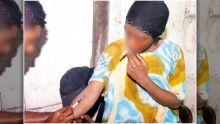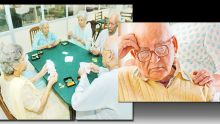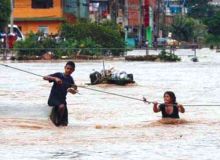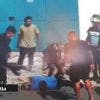Has our little paradise been cursed? Scrupulous crimes are on the rise. This week, some young professionals debate on the main causes of this worrying trend and what can be done to render our country more secure. The population has not yet forgotten the scrupulous crime committed at Camp De Masque Pavé. Last week, the country was once more shocked by the murder of an 80 old woman. These all too common happenings lead us to ask questions about our feeling of security. What are the root causes of such heinous crimes? Do our laws have a sufficiently deterrent effect to prevent such crimes?
[[{"type":"media","view_mode":"media_large","fid":"15225","attributes":{"class":"media-image wp-image-25508 alignleft","typeof":"foaf:Image","style":"","width":"219","height":"218","alt":"young-ashraf"}}]]Ashraf Boolaky: “Our country has become insecure”
Medical Laboratory Technologist, Mudasseer Ashraf Boolaky believes that our country has become insecure since the past few years. “Nowhere is safe, neither day nor night. Not a single day passed by without violence being evoked. Attacks, muggings, thefts, armed robberies, gang rape, indiscipline, insults, sexual abuses whatever form it takes, violence and the feeling of insecurity which it generates in us. Crime is one of the world’s oldest social problems. Almost every generation has felt threatened by crime and violence.” “People are easily exposed to new technology leading to more organised and structured crimes. There is a correlation between poverty and crime. Most criminals are usually drugs addicts, jobless people and young persons. The fast growing criminal population is actually the youngsters. These teenagers solely focus on their academic studies and how to pass successfully from the school. Eventually, the relationships between parents, teachers and students come under duress.” He states that for a criminal jail or capital punishment is not the solution. “The legal process should take less time. Economic inequalities should be targeted. More sensitisation campaigns among youngsters; integrate violence prevention into social and educational policies, should be considered. Laws should be enforced by giving ‘Life sentences’ to criminals. People would then think twice before undertaking any unlawful act. The fear of tough punishments would deter them. Also, police patrols should be increased at night and in remote areas.”[[{"type":"media","view_mode":"media_large","fid":"15229","attributes":{"class":"media-image wp-image-25512 alignleft","typeof":"foaf:Image","style":"","width":"210","height":"275","alt":"young-pro-stephanie"}}]]Stephanie Mavac: “Mauritius is no more a safe country”
22-year old Stephanie Mavac works in a telecommunications company. “We keep on hearing and reading about people are resorting to violence and killing each other mercilessly. Now, we have started to believe that Mauritius is no more a safe country to live in. We always tend to judge people on their misconduct and approach the problem by adopting a law enforcement approach only. If we really want to stop crime, why don’t we try to find out the root cause of such demeanour?” Moreover, she argues that prisoners often state that life behind bars is better because once they are in society, they have to struggle to find a job in order to lead a better life. “Children raised by parents who engage in violent behaviours are more likely to have emotional and behavioural problems. They gradually start to adopt the belief that violence will help solve conflicts. We should treat violence as a public health concern. We should use communication campaigns and technology to reach every child and family. Why don’t we opt for family interventions and early childhood education?” According to her, people from poverty-stricken families are more prone to violence. “Our materialistic society has taught us that the more wealth you earn, the more you will become successful or else you will be viewed as a failure. The government should find ways to alleviate poverty, create more jobs and increase access to education to help families. We should encourage people to become role models instead of threats to society.”[[{"type":"media","view_mode":"media_large","fid":"15227","attributes":{"class":"media-image wp-image-25510 alignleft","typeof":"foaf:Image","style":"","width":"227","height":"241","alt":"young-pro-jevina"}}]]Jevina Comaren: “Socio-economic conditions encourage marginality”
Jevina is currently in the accounting sector and believes that the gory claws of crime still plague us. “Our beloved island underwent ghastly acts. The security of Mauritian people is utterly compromised. First, socio-economic conditions encourage marginality, deprivation among the socially-excluded. Those ‘living on the edge’ suffer from poor educational achievement; unemployment; lack of involvement in community organisations and support. Family is the cornerstone of society. Hence, people bereft of a proper upbringing and informal social control, sink in darkness and are entangled in the vicious cycle of poverty.” She further explains “modernity favours a consumerist culture, thereby instigating motives for crimes. Furthermore, politics play a vital role in society-corruption, embezzlement, and nepotism.[[{"type":"media","view_mode":"media_large","fid":"15228","attributes":{"class":"media-image wp-image-25511 alignright","typeof":"foaf:Image","style":"","width":"175","height":"241","alt":"young-pro-natasha"}}]]Natasha Marie: “Tougher laws need to be implemented”
27-year old Natasha recently moved to Mauritius from Australia. According to her, your feeling of safety depends on where you are. “At work for example, I do not feel safe but driving at night around 10 pm is scary. Police presence has definitely increased which is helping make communities feel a little bit safer.” She argues that Mauritius should introduce strict laws to combat the increasing criminality rate. “Tougher laws in general need to be in place. Unfortunately, this will take a lot of time as different groups have differing opinions. Whether or not this is a priority for our politicians is another question.”[[{"type":"media","view_mode":"media_large","fid":"15230","attributes":{"class":"media-image wp-image-25513 alignleft","typeof":"foaf:Image","style":"","width":"214","height":"255","alt":"young-pro-tariq"}}]]Tariq Jhungeer: “The situation is worsening in Mauritius”
Tariq argues that our beautiful island has recently witnessed many atrocities. “The situation is degrading in Mauritius. The crime rate is seriously and alarmingly increasing. Be it through the radio or the newspapers, you will hear or read about murders, accidents, rapes, thefts and the list is very long. At times, you feel you are not so safe in Mauritius. It is depressing to see that people are being attacked or murdered in their own houses and this is really horrible.” In order to prevent this kind of situation from arising, Tariq maintains that law and order should be reviewed and reinforced. This will cause citizens to think twice before doing any horrendous act. “Youngsters should be taught how to solve an issue without having recourse to violence. I believe there is a lack of moral values in general and it should be inculcated in people. They should be taught what is right and what is wrong. Parents should keep a close eye on their children in order to ensure their safety and well being. A proper upbringing of a child will surely make a difference. Nowadays, children are protected by the laws and they think they can do anything they want. Children’s right should definitely be reviewed.”[[{"type":"media","view_mode":"media_large","fid":"15226","attributes":{"class":"media-image wp-image-25509 alignleft","typeof":"foaf:Image","style":"","width":"192","height":"258","alt":"young-pro-adjmal"}}]]Adjmal Lotun: “The way forward is to tackle the root causes”
30-year old Adjmal works in the public sector in a technical capacity for diverse infrastructural projects around the country. He avers that Mauritius is still relatively secure as compared to other African countries, though the feeling of insecurity is growing with each new crime. “People are still going out in numbers but are generally careful not to go out alone, especially at night. The culprits behind crimes like theft and burglary remain drug use, unemployment, lack of education and poverty. However, violent crimes like murder or rape have also to do with the psychological health of certain individuals, their influences, and more importantly, in what conditions they were raised,” he says. For him, the way forward is to tackle the root causes of these social ills. Both the government and population have the responsibility to work hand in hand to identify the vulnerable and less fortunate members of society, reach out to them and provide them with the help they need to get out of the plights that affect them. “We have to work on the basis that nobody is born with a natural inclination to commit crime and that it is mostly the environment and conditions of their upbringing which shape up what individuals will become in society. We must have a concerted effort towards eradicating poverty and drugs while at the same time bringing education to the doorstep of those who need it the most,” he suggests.
Notre service WhatsApp. Vous êtes témoins d`un événement d`actualité ou d`une scène insolite? Envoyez-nous vos photos ou vidéos sur le 5 259 82 00 !


































![[Breaking News] Partielle au no 10 : le Writ of Election émis ce dimanche](https://defimedia.info/sites/default/files/styles/square_thumbnail/public/untitled_design_214.jpg?itok=DCEEGuDJ)


